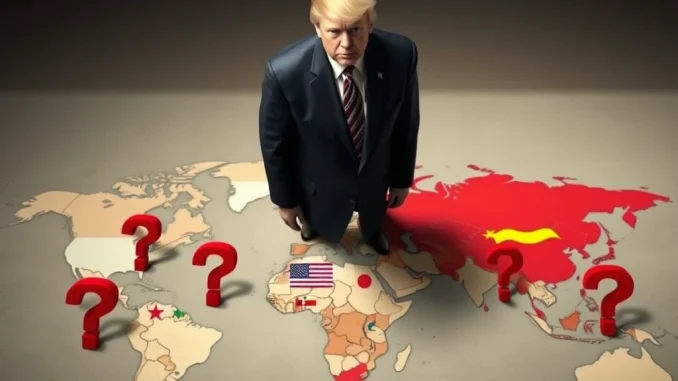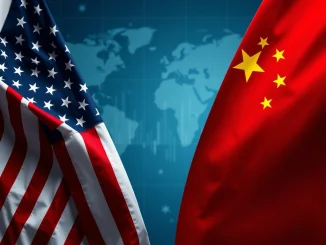
In the fast-paced world of finance and investment, global political and economic events often ripple through markets, influencing everything from traditional stocks to the burgeoning cryptocurrency space. Understanding these macro shifts is key for any investor. A recent announcement from the Trump administration highlights just such a development, one that could introduce new layers of complexity and potential Market Uncertainty on a global scale.
Trump Trade Deal: A Direct Challenge Issued
According to a report from jin10.com, U.S. President Donald Trump has indicated a significant step in US Trade Policy. The administration plans to send formal letters to countries within the next week and a half. The purpose of these letters is clear: to directly ask each nation to state whether they accept or reject a specific trade agreement.
This move signals a push for resolution on trade fronts, potentially accelerating negotiations or forcing a clear stance from trading partners. The short timeframe for a response suggests an intent to quickly clarify international economic relationships and trade pacts under the current U.S. leadership.
Understanding US Trade Policy Under Trump
President Trump’s approach to US Trade Policy has been characterized by a focus on bilateral agreements, reducing trade deficits, and using tariffs as a negotiating tool. This contrasts with previous administrations that often favored multilateral agreements.
Key aspects of this policy include:
- Bilateral Focus: Prioritizing one-on-one deals over large, multi-country pacts.
- Tariff Application: Imposing tariffs on goods from countries deemed to be engaging in unfair trade practices.
- Renegotiation: Seeking to renegotiate existing trade agreements, such as NAFTA (replaced by USMCA).
- Direct Pressure: Applying direct diplomatic and economic pressure to achieve desired trade outcomes.
This latest announcement about sending letters fits within this pattern of direct engagement and pushing for definitive answers on trade terms.
The Stakes for International Trade
The decision point presented by the U.S. could have significant ramifications for International Trade relations. Countries receiving these letters will face a strategic choice:
Option 1: Accept the Trade Deal
- Potentially secure favorable terms with the U.S.
- Reduce the risk of tariffs or other trade barriers from the U.S.
- Align economic policy more closely with U.S. interests.
Option 2: Reject the Trade Deal
- Risk facing increased trade barriers or tariffs from the U.S.
- Maintain economic autonomy but potentially at the cost of access to the U.S. market.
- Signal a differing economic or geopolitical stance.
The collective responses from nations will reshape the landscape of International Trade, potentially leading to new alliances or increased friction.
Navigating Global Economic Impact
Trade agreements, or the lack thereof, have a tangible Global Economic Impact. Changes in trade relationships can affect:
- Supply Chains: Businesses may need to restructure how they source materials or manufacture goods.
- Consumer Prices: Tariffs can increase the cost of imported goods.
- Export Markets: Industries reliant on exporting goods to the U.S. or other affected countries could see significant changes.
- Foreign Investment: Uncertainty in trade policy can make countries less attractive for foreign direct investment.
This period of decision-making initiated by the Trump Trade Deal letters could trigger shifts in these areas, influencing economic growth and stability worldwide. Investors, including those in the crypto market, often watch these macro indicators as they can influence overall market sentiment and liquidity.
Assessing Market Uncertainty
Any period of significant geopolitical or economic negotiation tends to create Market Uncertainty. Financial markets dislike unpredictability. The upcoming deadline for countries to respond to the U.S. trade proposal adds a new layer of this uncertainty.
How might this play out in markets?
Traders and investors will be watching for:
- Country Responses: Which major trading partners accept or reject the deal?
- U.S. Reaction: How will the U.S. administration respond to rejections? Will new tariffs or measures be announced?
- Economic Data: How do trade-sensitive economic indicators react in the coming months?
While the direct link to cryptocurrency might seem distant, increased Market Uncertainty in traditional finance can sometimes lead investors to reconsider their portfolios, potentially looking at alternative assets. Conversely, broad economic downturns caused by trade conflicts could reduce overall investment capital. It’s a complex interplay.
Conclusion: Watching the Global Chessboard
President Trump’s decision to directly challenge countries on their stance regarding a U.S. trade agreement marks a pivotal moment in current US Trade Policy. The letters, expected within days, will force nations to make crucial decisions that could redefine International Trade relationships for years to come. The potential Global Economic Impact is substantial, and the resulting Market Uncertainty is something all participants in the financial world, including those focused on digital assets, should monitor closely. While the Trump Trade Deal announcement isn’t crypto news itself, it’s a significant piece on the global economic chessboard that could indirectly influence market dynamics.



